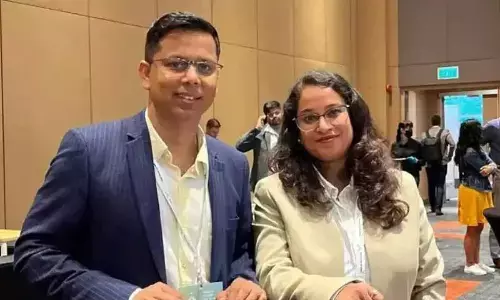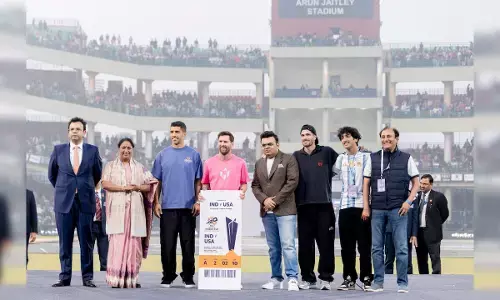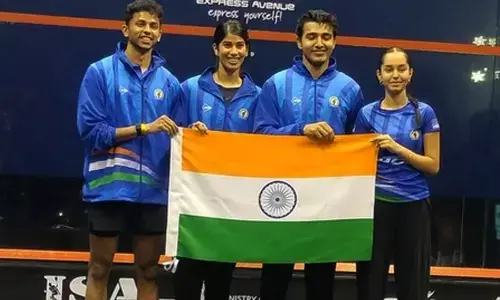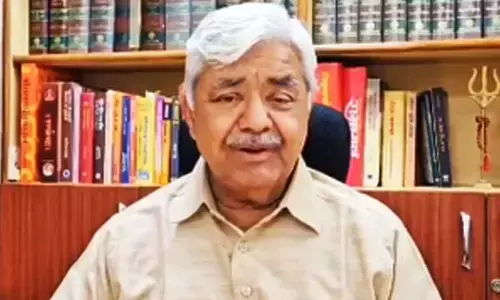Ambedkar: A crusader of human rights and social justice
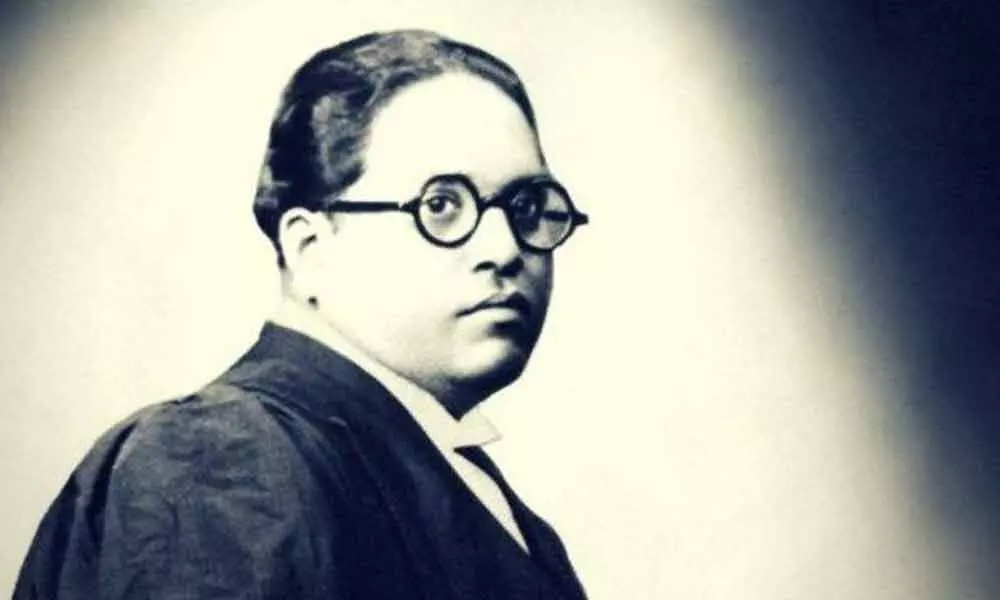
Ambedkar: A crusader of human rights and social justice
“Observe the life by cause and consequences; explore the life by wisdom, Treat the life by equality, complete the life with love” - Gautam Buddha.
The life of Dr B R Ambedkar implies to be an apt example of this great quote of Buddha as Ambedkar all along his life stood for these values. His childhood was replete with oppression and dejection as consequence of untouchablility.
By realising the role of education in emancipating from these social evils, he reached the zenith of academic excellence.
Eventually his wisdom expanded to find the solution for the very cause of inequality and oppression in the society.
He enchanted the principles of Equality, Liberty and Fraternity to liberate the masses from oppression.
His love for humanity and human rights transformed him as a crusader to guide voiceless people of the country. On his birthday today, he is remembered as symbol of equality and social justice not only in India but also across the Globe.
If we take a bird's eye view of the life of Ambedkar, we realise that at every stage of his life, the practice of untouchability in Hindu society has haunted Bhim Rao.
Though he was a better performer than his peers in studies from the school days, the caste tag kept on depriving him of the minimum privilege which the other caste children of his age groups enjoyed, be it at school or in the society.
In schools, he was deprived of drinking water. He was not allowed to sit with the other children in the class.
He painfully recalls in the book 'waiting for visa' the struggles he along with his siblings had to face for availing public transport to travel from Masur railway station to Koregaon where his father was working.
Then when he returned from abroad amidst his higher studies to obey the sponsored condition of Baroda king, irrespective of his educational qualification, he was restricted to availing any public accommodations owing to his caste.
On this incident he writes that 'for five years when he was abroad, the consciousness of untouchability was wiped out of his mind' but on return the situation was heart rending.
Further, when he joined government office, the office staff including his clerks started looking down up on him through the caste lens.
There was hardly any recognition for his knowledge in the caste prejudiced society. Instead, only caste based ill treatment was meted out to him at all stages.
The impact of these series of dispiriting incidents intensified his determination to root out the inhuman caste oppressions from the society.
Eventually, he succeeded in expounding the unnatural characteristics of the caste system on international forum at New York in 1916 by a thorough research on the caste system at the age of twenty.
Bhim Rao's thirst for knowledge was so much so that he was one among very few who has acquired the highest number of degrees covering almost all major subjects like Philosophy, History, Economics, Politics, Sociology and Law from the world famous universities.
When he was in Colombia University at New York, his intellectual interest attracted him towards the then stalwarts of history, economics, philosophy and anthropology namely Prof. James Shotwell, Prof. Edwin Seligman, Prof. John Dewey and Prof. Alexander Goldenweiser who are reported to have greater impact on honing his original thought process and intellectual growth.
As the original thought process of Bhim Rao started expanding, his determination - to delve in to the problems impeding the society from which he has come from - also gained momentum.
Finally his thoughts started publicising in the form of historic works like, 'Castes in India: Their Mechanism, Genesis and Development'; 'Ancient Indian Commerce'; 'National Dividend of India - A Historic and Analytical Study' etc. His unquenched intellectual thirst propelled him to join the London School of Economics where he did his PhD research on the subject 'The Indian Rupee'.
His work was later published as 'The Problem of the Rupee: Its Origin and Its Solution'. The depth of Ambedkar's understanding on Indian economy was incredibly strong and demonstrative. In fact, based on his report that the 'Hilton Young Commission' recommended for the establishment of 'Reserve Bank of India' to ameliorate problem of Indian rupee.
As a tribute to his legacy in economics, the contemporary economist and a Nobel laureate Prof. Amartya Sen regarded Ambedkar as his father in economics.
On social front, Ambedkar was a staunch believer of political and economic empowerment of depressed classes to achieve equality.
The depressed & disadvantaged classes according to him was not only the untouchables but also the women, minority groups and tribals who had been stoically suffering due to religious and customary practices in Indian society.
His proposition of labour right, minimum working hours, maternity leave for working women, women safety at work places, Scheduled Tribes Commission under Article 342 of the Constitution are few illustrious examples of his comprehensive view on depressed & disadvantaged classes.
Recognising the caste as the root cause for inequality and the main impediment for fraternity, he fought vociferously for political representation of the oppressed classes in the pre independent India which was culminated in Poona Pact reluctantly signed by him.
Ambedkar internalised the democratic tenets of his professor in Colombia University Prof. John Dewey who believed democracy as way of life rather than simply a political system.
He expanded and adopted Dewey's views in to the Indian context to empower the depressed class by expounding the democratic principles and convincing his opponents to embrace the fraternity as way for harmonious life.
On various occasions, he deliberated with the customary leaders and the colonial rulers against the systemic discrimination prevailing in the society and suggested the ways to overcome it.
He could capture the imagination of depressed classes and marshalled the mass movements to unearth untouchability through his popular newspapers like Mook Nayak, Bahishkrit Bharat and Equality Janta.
His campaign against the archaic inhuman derogatory practice in the name of birth, purity and religion was recorded in the historic event like Mahad Satyagraha: opposing the regressive customs of depriving public water access to the untouchables.
His penchant for democratic ethos and social justice reached its pinnacle in the form of legendry constitution which makes Indian the largest democratic country in the world.
The preamble which is acclaimed as the jewel set of constitution by the constituent assembly members opens up the vistas of ideals (sovereign, democratic, republic) and aspirations (Justice, Liberty, Equality and Fraternity) which the state shall endeavour to achieve.
In our Constitution, the essential components of world's finest statutes were judiciously converged to meet the country's present and future need for achieving the social justice through democratic institutions.
While his critics call constitution as just an amalgamation from all the available ones, but its novel strength is evident in continuing to keep the biggest and socio culturally diverse country intact and strong for seven decades and still on.
In recognition of his achievements, leadership and authoring the Constitution of India, Columbia University conferred an honorary doctorate for his service as "a great social reformer and valiant upholder of human rights", on June 5, 1952.
Being the chief architect of India Constitution, Ambedkar always maintained that constitution should provide for individual to inculcate the spirit of scientific enquiry for the cultivation of mind to achieve the wellbeing of the society.
Through his speeches and writings we can discern that citizens should have religious freedom to choose their belief and faith.
According to him, religion is not having a fixed meaning; but, it is a thought process that passes through many stages. Each stage is termed as religious thought.
He believed that by birth no one knows his or her religion, upon exposure to the environment, he or she start identifying with the belief system called religion.
As the individual is capable of thinking, analysing, judging and adopting what is best for them, so the liberty should be to the individual to choose the religion as per their conscience and convictions.
Observing the role of religion in shaping the life of individual, he announced to renounce the Hinduism and explored various religious scriptures of the world before deciding to accept the Buddhism that profess reasoning, morality and equality as its principle.
He believed that by embracing the teachings of Buddha, one can liberate themselves from the draconian clutches of untouchability and savour the fruits of equality.
Finally on 14th October 1956 he along with his 3,80,000 followers accepted the Buddhism at Deekshabhoomi Nagpur.
Bhim Rao who hailed from a remote village with very humble background has become what his followers fondly call him as Baba Saheb Dr. B. R. Ambedkar with unparalleled accomplishments that ignited the light of knowledge, equality, and fraternity among millions of Indians who have been suffering in the darkness of ignorance for centuries.
In the year 1990, he was posthumously awarded with the highest civilian award 'Bharat Ratna' by the government of India.
His depth of understanding of social issues is acclaimed across the world and termed him as greatest social reformer.
In honoring his legacy of dedication to equality and social justice, the city of Burnaby in 2020, the Province of British Columbia in 2021 proclaimed 14 April as 'Dr. B. R. Ambedkar Equality Day'.
His strong conviction on reasoning and perpetuation of moral principle is more important than hero worshiping is evident from his famous statement "Men are mortal. So are ideas. An idea needs propagation as much as a plant needs watering.
Otherwise both will wither and die". In my opinion he is one of the finest soul who lived ordinary life while making extraordinary impact on the lives of millions of Indians in realizing the meaning and purpose of their life.
(The author is Joint Collector, East Godavari. The views and opinions expressed here are those of the author and do not necessarily reflect the official policy or position of the organisation he is working for)








